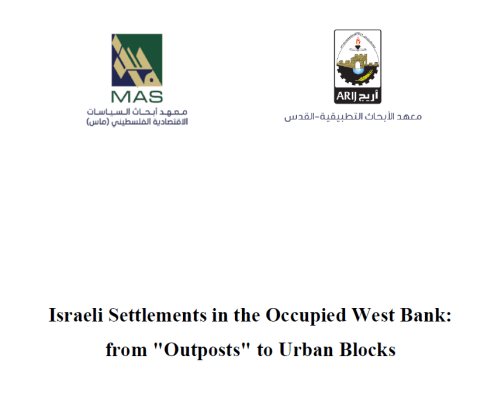Israeli Settlements in the Occupied West Bank: from "Outposts" to Urban Blocks
Over and over again, Israel continues to manipulate the status of the settlements and outposts in the occupied West Bank, with the aim to create ambiguity and confusion about what is legal and what is illegal, while the fact is that all Israeli settlements and outposts in the occupied West Bank are undoubtedly illegal, since they were forcibly built on lands belonging to Palestinians and without their consent; as the issue of resolving the conflict in a just and peaceful way becomes impossible.
In disregard of the international law, the Fourth Geneva Convention of 1949, and the signed agreements, the consecutive Israeli governments continue with their settlement activities in the West Bank to the fullest, which reflects the extent to which Israel is committed to its expansionist settlement plans in the occupied Palestinian territory. This in turn has led to irreversible facts on the ground, to impose its vision of resolving the conflict with the Palestinians, which is devoid any hope of establishing an independent, viable Palestinian state on the 1967 borders.
On the 12 of February 2023, the so-called “cabinet” in the Israeli government unanimously approved the legalization of nine Israeli settlement outposts illegally and unilaterally established in the occupied West Bank during the past few years. The Israeli outposts targeted in the latest approvals are: Avigail and Asael outposts established on lands of Hebron Governorate; Beit Hajla (Beit Hogla) outpost established on lands of Jericho Governorate; Givat Harel and Malachi Hashalom outposts established on lands of Ramallah Governorate; Givat Arnon outpost established on lands of Nablus Governorate; Mitzpe Yehuda outpost established on lands of Jerusalem governorate; Sde Boaz outpost established on lands of Bethlehem governorate, and Shaharet outpost established on lands of Salfit governorate.
This paper has been prepared by the joint efforts of The Applied Research Institute – Jerusalem (ARIJ) Institute and the Palestine Economic Policy Research Institute (MAS). We aim to draw attention and increase knowledge among the Palestinian public and decision-makers, about the dangers Israeli settlement outpost pose, not only on the possibility of establishing an independent and viable Palestinian state, which is confirmed and documented; but also on the Palestinian economy, natural resources, environment, and the costs that the Palestinian people incur every day, as a result of the 56 years of the Israeli occupation. In the face of this planned and programmed settlement expansion policy, which is implemented by an Israeli system armed with colonial methodologies and mechanisms; there is no Palestinian or international, official or civil, body that bears the responsibility of monitoring and analyzing this process, which constitutes the beating heart of the Zionist project. The only exception is the work of ARIJ and some official and Palestinian research organizations, with minimal resources that do not respond to the level of the challenge, in addition to some international efforts in the field of estimating the cost of the Israeli occupation.
ARIJ and MAS emphasize the urgent need for official, civil, and international bodies/organizations to take significant action in bolstering Palestinian capabilities to effectively address this critical conflict, an aspect of which this paper highlights, and which can serve as a common ground for joint collaboration between all concerned parties.
This report primarily utilizes databases available at ARIJ concerning Israeli settlements, as well as high-resolution aerial photos from 1997 to the present day. These resources enable us to track the evolution and growth of settlement outposts over time, in addition to incorporating data from several Palestinian research and human rights organizations, as well as relevant international and Israeli sources referenced throughout this report.
Full Report in Attachment:

